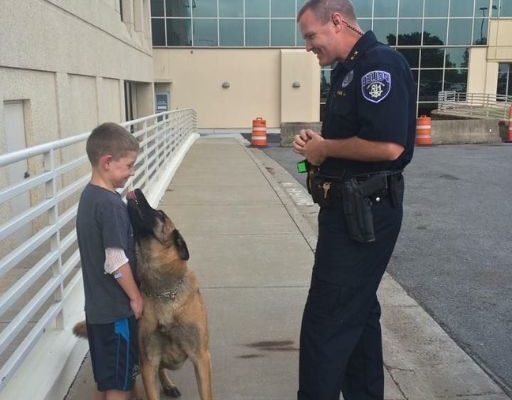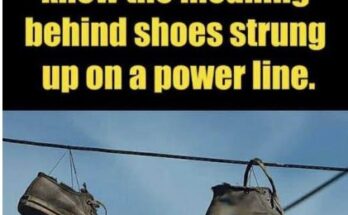
It was supposed to be just another quiet afternoon outside the station. Koda and I were doing our usual rounds, enjoying the crisp breeze and the slow hum of the town around us. We had just finished a training session, and Koda, ever the professional but always eager for affection, was sitting obediently by my side when I noticed a boy standing a few yards away.
He looked about 8 or 9, wearing an oversized t-shirt that hung loosely over worn-out shorts. His sneakers were scuffed, laces dragging slightly on the pavement. He shifted from foot to foot, hands stuffed deep into his pockets, his eyes locked on Koda. There was a nervous energy about him, but also something… something more — like he was holding back a storm.
I gave a small wave. “Hey there, buddy. You wanna say hi?”
He hesitated. I could see the battle play out in his small frame — fear, hope, sadness. Finally, he took a cautious step forward. Koda, sensing the hesitation, stayed perfectly still but wagged his tail in wide, slow arcs. It was Koda’s way of saying, It’s okay. I’m safe.
When the boy got close enough, he reached out tentatively, his fingers brushing Koda’s soft fur. Then, without warning, he dropped to his knees and wrapped his arms tightly around Koda’s neck, burying his face in the thick fur. His small shoulders shook as he cried silently.
I crouched down beside them, placing a gentle hand on his back.
“What’s wrong, buddy?” I asked quietly.
Through choked sobs, he whispered, “He looks just like Max… my dad’s dog… before he left.”
The words hit like a punch to the gut. I stayed quiet, letting him take his time. Over the next few minutes, between gulps of air and tears, the story came out in pieces. His dad had always promised that Max would be theirs forever. No matter what happened, no matter how busy life got, Max would be there, part of the family. But promises, as Eli had learned the hard way, sometimes broke.
His dad stopped coming home one day — no calls, no explanations. Just… gone. His mom worked long hours now, trying to keep the roof over their heads. And Max, who had been Eli’s best friend and only real comfort, got sick. Without money for vet bills, there was little they could do. Max had passed away a few months ago. Since then, Eli said, the house felt “too big and too empty.”
We stayed there for a long while, Koda lying patiently, letting Eli hold on as long as he needed. When Eli finally pulled away, his face was blotchy but a little lighter, like he’d let go of a heavy weight he had been carrying alone.
I offered to walk him home, and he accepted with a small nod.
His mom answered the door, her expression instantly shifting from worried to relieved when she saw Eli standing there. She knelt down, pulling him into a tight hug. When she looked up at me, her eyes shone with gratitude — and maybe a little embarrassment.
“I’m so sorry if he was bothering you,” she said quickly.
“Not at all,” I replied. “Koda’s a good listener. Sometimes we all need one.”
Eli looked up hopefully. “Can Koda come visit again?”
I smiled and promised, “We’ll make sure of it.”
Over the next few weeks, true to my word, Eli became a regular visitor. I spoke to my captain, and we arranged special afternoons where kids from the neighborhood could spend time with the K9 units. Eli was often the first to arrive and the last to leave. He and Koda had a bond now, one that didn’t need many words.
Each visit, I noticed small changes. At first, Eli barely spoke, sticking close to Koda’s side. But over time, he started laughing again — real, belly-deep laughter that made everyone around him smile. His mom, too, began to open up. She admitted how overwhelming it had been, trying to be everything for Eli while dealing with her own heartache.
One afternoon, after a long game of fetch, Eli sat down next to me on the curb, Koda sprawling out between us.
He fiddled with a loose thread on his sleeve before asking, “Do you think Dad misses us?”
I took a deep breath. I wished I had a perfect answer, something that could erase all the pain behind that question.
“Sometimes people get lost in their own mistakes,” I said carefully. “But none of that changes how much you deserve to be loved. Never forget that, okay?”
He nodded, chewing on the inside of his cheek, thinking hard.
Months passed. Seasons changed. Eli’s mom started attending a support group I recommended, meeting other single parents who understood her struggles. She found work with better hours. Things weren’t magically perfect, but there was a steadiness now, a rebuilding.
Then, one evening after my shift, I found a plain envelope tucked into my mailbox at the station. It was from Eli’s mom. Inside was a handwritten note:
Officer,
Thank you for not treating my son like a problem to be fixed. Thank you for treating him — and us — like we mattered. Eli’s dad reached out. He wants to try to be part of Eli’s life again. We’re taking it slow, but… Eli has hope now. He smiles again. He dreams again. And I think — no, I know — that Koda helped make that happen. Thank you.
I set the letter down and smiled, reaching down to scratch behind Koda’s ears.
Sometimes, the biggest difference you make isn’t in the moments you plan — it’s in the quiet, unexpected ones, where you simply show up, listen, and care. Sometimes, all it takes is a wagging tail and a little bit of patience to help a broken heart start to heal.



